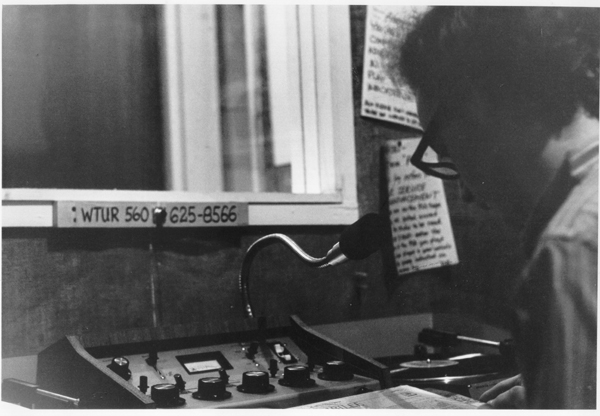Who We Are and What We’re About
WMFO is Tufts University's student and community operated freeform radio station. Broadcasting out of Curtis Hall, WMFO programming can be heard across the campus and throughout the greater Boston area. Our dedication to the freeform ideology and “keeping it freeform” has and continues to provide the greatest freedom of expression for our DJs. From pop to rock, classical to hip hop, and talk to live bands, you never know what you will hear when you tune in to 91.5 FM. In addition to our student programming, many of our DJs come from the Medford and Somerville communities, some of whom have been on air for over 30 years. This dedication and the passion of our community has helped to make WMFO the institution it is today.
The station is managed by an elected board of student DJs, and is maintained by a larger group of student and community volunteers. We broadcast 24 hours a day, 7 days a week, and 365 days a year from the Tufts University Medford/Somerville Campus and our FCC City of License is Medford, Massachusetts. We broadcast at 91.5 MHz on the FM band, and our coverage area is bordered by Melrose to the north, Allston & Back Bay to the south, Watertown to the west and out over the Atlantic Ocean to the east. (See coverage maps) The broadcast can also be accessed online anywhere from the WMFO website.
Early History
WMFO's earliest iteration came as WTCR (Tufts Community Radio), an amateur radio station between 1956 and 1961. After becoming a campus-sponsored organization, WTCR operated out of Braker Hall. The station broadcast on AM bands, reaching the campus proper at peak power.
Shutdown
Despite the efforts of the staff, WTCR's dependance on dated military equipment led to the station's shutdown. After various radiation leaks were detected by FCC inspectors, the station was forced to disband. Station programming dwindled until 1961, when the group officially split.
Reincarnation as WTUR
The fall of WTCR left a body of funds that, until 1967, were left unused. In 1967, a group of students again formed a radio club, this time operating from Curtis Hall. The station, rebranded WTUR (Tufts University Radio), also broadcasted on the AM band, but with better equipment. In 1969, with the help of an $8000 university grant, WTUR moved to 88.3 FM. It is in this period that the “freeform” nature of WTUR became apparent, with shows ranging from talk to jazz.

Digital Collections and Archives, Tufts University.
Second Shutdown
In 1970, students in WTUR's membership planned a prank involving the local MBTA commuter rail connections. By utilizing the rails as a massive ground antenna, WTUR was able to broadcast as far as Quincy, Massachusetts and Nashua, New Hampshire. Though effective, the prank violated FCC rules and WTUR's allotted signal range. As a result, WTUR's license was revoked and the group was disbanded by university officials.
WMFO
Soon after the dismissal of WTUR's broadcasting license, interest was renewed in creating a campus-run radio station. On February 6th, 1971, WMFO took over operations of the Curtis Hall studios, serving as an AM version of WTUR, playing “Here Comes the Sun” by the Beatles. In late 1971, WMFO was granted a 10 watt FM license, taking over 91.5 FM. This time, the station received its mandate as an education, community outreach station, requiring it to broadcast national news and services.
Fire
In 1974, WMFO expanded to 24 hour programming, fully developing its freeform nature. Station operations continued to grow until April 2, 1977, when a major fire destroyed most of the Curtis Hall studios. Despite suffering $100,000 in damages and the loss of most of its vinyl collection, WMFO resumed operations six hours after the fire. By the fall, the studio was renovated, allowing WMFO to continue broadcasting, with equipment upgrades arriving in 1978. In January 1982, the FCC approved WMFO’s request to operate at 125 watts, after support from the university and community.
Gone Digital
In March 2009, WMFO went off air for a week in order to update its analog system to a new, all-digital one. A primary feature of the update was the introduction of our Rivendell Radio Automation server, which is home to WMFO's large collection of lossless digital media.


